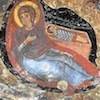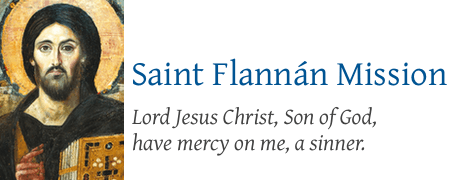 In the Name of the Father and of the Son and of the Holy Spirit, one God. Amen. Dear beloved, let us remember the Holy martyrs Elpidius, Marcellus, and Eustochius. Holy saints and martyrs, pray for us!
In the Name of the Father and of the Son and of the Holy Spirit, one God. Amen. Dear beloved, let us remember the Holy martyrs Elpidius, Marcellus, and Eustochius. Holy saints and martyrs, pray for us!
The Holy Martyr St Elpidias was a court official. When he professed his Christian faith, he was tried before a judge, together with fellow martyrs Marcellus and Eustochius, they were tortured till they died in a burning fire. When the people gathered around the ashes of the martyrs, Christ and the angels appeared, and our Lord resurrected St Elpidias. The emperor Julian the Apostate quickly ordered the arrest of St Elpidias again. When St Elpidias was praying while tortured, idols near his vicinity crumbled to dust, and more than 6,000 pagans witness this and believed in Christ. The saint was then burned to his death the second time.
To us in the Church, this marks the 40 days of marching forward towards the joy of the Nativity of our Lord and Christ. The West calls it “Advent”, which is derived from the Latin word “advenire” which means “to arrive”, a hail of announcement to the people that our Christ and Lord’s birth is coming.
We call it the Nativity Fast, also the St. Philip’s Fast.
Holy Apostle Philip once called upon God to bring His wrath upon those who were torturing him to death. An angel of the Lord came upon St Philip and admonished him for having such a thought, since justice belongs to God alone, and not ours. The angel told St Philip that he would not enter paradise until 40 days past his repose. St Philip quickly told the other apostles of this Divine sign and asked his brethren to pray for 40 days after his repose. We first heard of this fast as “St Philip’s Fast” from the canons attributed to the 6th century Patriarch St John of Constantinople.
What makes the Nativity Fast different from the fast in Great Lent is that while the Lenten season is solemn with penance, the fast preceding the Nativity drums onwards with joy and earnest expectations.
The Nativity is very much about Christ our Lord, and also our beloved Most Holy Theotokos, Mother of God. Our Panagia represents us and our hope and desire to be ever closer to our God, as God reaches to us in the most moving ways, with love.
Was it an easy time for our Panagia the days preceding to the birth of our Christ and Lord?
Holy Tradition teaches us that the Jewish high priest and council accused both our Theotokos and Righteous Joseph when they found that the Most Blessed Mary was with child. Our Panagia cried and said, “The Lord God is My witness that I am innocent and have known no man.” Righteous Joseph also swore that he was innocent of any such sin. Our Most Blessed Mary then proved miraculously that she was with child and yet unviolated, and both of them were released to go home, joyous with thanksgiving unto our Lord. But their trials were not ended. They traveled the difficult journey over 3 days, from Nazareth to Bethlehem, and having found no place to stay for the night, had to seek the shelter for cattle. It was here in this humble cave, hidden away from the busy world, the Most Blessed Virgin mary prayed and gave birth to our Lord Jesus Christ.
Before the Nativity of our Lord, our Panagia labored and toiled. There was no rest or comfort for her. Yet she kept praying unto the Lord.
We are taught to share this spiritual labor with our beloved Panagia, to rein in our flesh during this period leading to the Nativity, with prayer and fasting. It is not mere physical fasting, but internal fasting too, and that we are to share our empathy and love for others whenever we can. Even though we are mere soil and salt of the earth, yet we are also called to be stewards and messengers of the Gospel of our Lord, and this is what we desire to bring – the Light of the world, to the world (1 Thessalonians 2:9-14). As we reflect upon St Luke 16:1-9, we are reminded that we cannot drown in the pursuit of mammon and yet hope to walk the difficult path towards God. After all, we do not own anything, and nothing we labor and toil for, truly is from us (Psalm 24:1-5, LXX 23). We are to take care of the ill and the needy, who are all made in the image of God.
At the same time, do not imagine under any mere man’s words, that God weighs us on our wealth and what we bring materially to the table. Isaiah 29:13 reminds us, as with the Gospel of our Christ and Lord, that God seeks our hearts, not our mere words and lip service. The holy saints of the Church have showed us thousands of times, thousands of ways, of what bringing our hearts in penance and prayer means to God.
Let us pray His Holy Name as we proclaim His Holy Nativity in the coming weeks, making the Sign of the Cross, “Lord Jesus Christ, Son of God, have mercy on me, a sinner”.
Let us close by praying the thanksgiving prayer:
It is truly meet to call thee blest, the Theotokos, ever blessed and most pure, and the Mother of our God. More honorable than the Cherubim, and more glorious than the Seraphim, without corruption thou gavest birth to God the Word: True Theotokos, we magnify thee.
O virgin Theotokos, rejoice; O Mary full of grace, the Lord is with thee. Blessed art thou among women, and blessed is the fruit of thy womb, for thou hast borne the Savior of our souls, Jesus Christ our Lord. Amen.
Fr Raphael+
Readings
Isaiah 29:13
Psalm 24:1-5 (LXX 23)
St Luke 16:1-9
1 Thessalonians 2:9-14

